What Does Rosemary Taste Like?
What does rosemary taste like exactly when there are so many recipes asking for it? Can you describe its flavor by words?
Indeed, rosemary is a green herb that has appeared in people’s lives since ancient times. It also plays a vital role in cooking ideas due to its unique flavor. But how impressive is it? Keep reading for a clearer view of rosemary’s flavor profile.
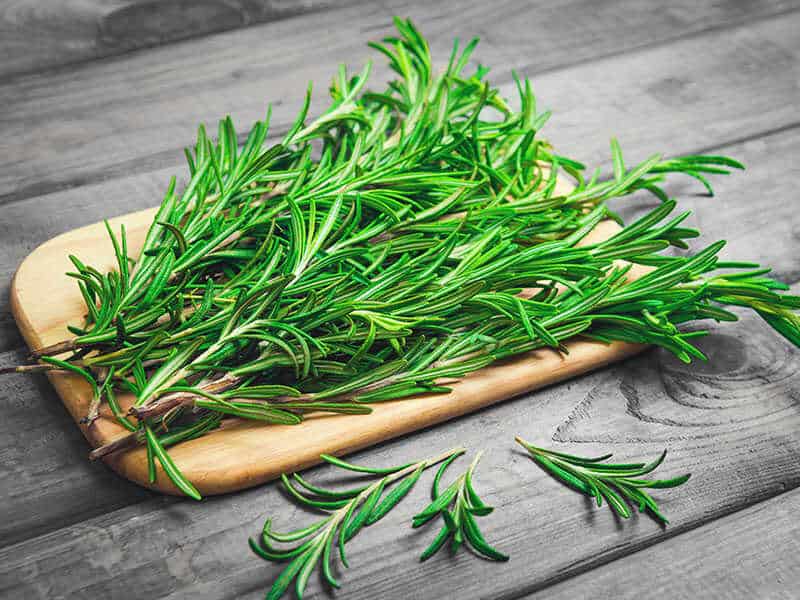
Rosemary – The Enchanted Herb Like Its Name

Rosemary is an evergreen herb that originated in the Mediterranean areas. Its scientific name is Rosmarinus Officinalis. and the term ‘rosemary’ was derived from this name.
The story behind the word ‘rosemary’ is fascinating. In Latin language, Rosmarinus means ‘dew of the sea’. And in ancient Greek times, people often called this herb ‘anthos’, which means ‘flower’ (1).
Rosemary has a long history, starting at 5000 BCE. But until the early 17th century, rosemary had just been introduced to Americans and Europeans.
Rosemary leaves have needle-like shapes with a nice aroma. Its flowers are white, purple, blue, or pink, depending on what variety it is. This green herb can grow both outdoors and indoors, with a lifespan of around 30 years.
You might have known rosemary is a wonderful ingredient in culinary, but their uses are more than that. Rosemary is also grown for ornamental and medicinal purposes. Moreover, the essential oil extracted from this herb can be used to produce perfumes or body products.
Another interesting fact about this herb is people also used rosemary as a symbol of remembrance for dead people in the past.
Rosemary’s In-depth Flavor Investigation
Discussing the rosemary flavor profile is an exciting topic. So for better comprehension, I divided this section into 2 smaller parts with full detail about the overall flavor of rosemary and the distinctive taste of specific rosemary types.
The Overall View About Rosemary Taste
If you have not tried rosemary before, I am pretty sure after reading this part, you would want to grab some as soon as possible. Why? Because their flavor is so unique that you cannot get it from any other herb.
Indeed, rosemary’s flavor is complex. You can feel various notes like woody, citrus, pine, lavender, sage, minty, lemon, pepper, resinous, and evergreen from 1 rosemary leaf. Moreover, you might sense some bitter and woodsy aftertaste.
It also has a very nice and robust aromatic, making rosemary work well in your dish without mixing with other herbs. So use rosemary sparingly to avoid it overpowering other components’ taste.
Plus, rosemary flavor will not decrease in a long cooking time with liquid. In contrast, the longer you cook rosemary, the more pungent taste it provides. Therefore, you can add the herb to your stews, soups, or slow-cooking recipes from the beginning.
Rosemary Flavor Based On Its Varieties (or Forms)
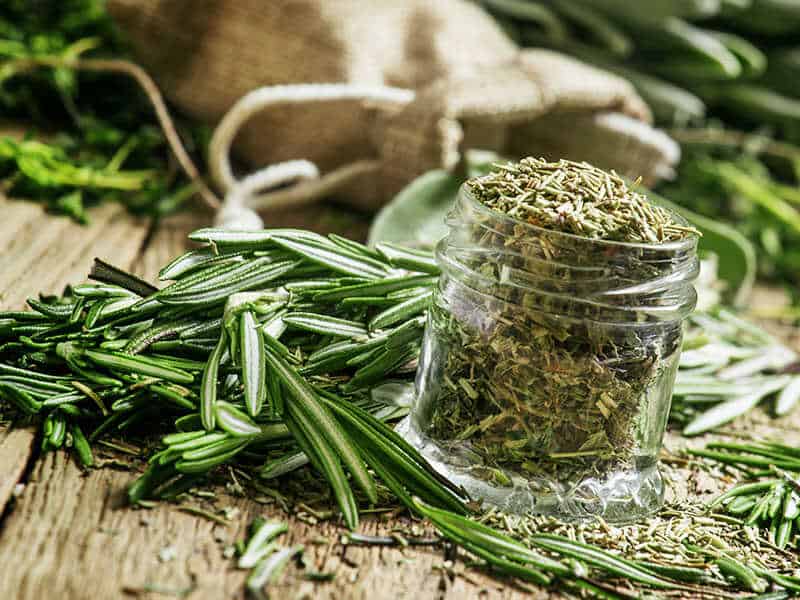
What I just introduced is the overall flavor of rosemary. In reality, there are some other varieties with distinctive flavor profiles. For example, Tuscan blue rosemary is the chefs’ favorite, thanks to its subtle, lemony, and piney taste.
But if you are a fan of BBQ recipes, you should go with rosemary Sissinghurst Blue as this variety has a smoky flavor. Another type for culinary uses is rosemary Spice Islands with clove and nutmeg notes.
Rosemary can be used in both fresh and dried herbs. So remember, though both fresh and dried rosemary shares the same flavor characteristic, dried ones are more concentrated and more robust than fresh ones.
What Ingredients Pair Perfectly With Rosemary?
Rosemary flavor is so unique, which makes it blend well in numerous recipes. Even though it has an intense aroma, this herb can complement other tastes, creating many flavorful dishes.
You can use fresh or dried rosemary to season your bread, pasta, sauce, sausage, cheese, meat (e.g., lamb, poultry, pork, beef, rabbit, etc.), fish, or vegetable dishes. Also, many people think rosemary tastes best when you combine it with butter.
Rosemary carries a savory hint, but they still work perfectly with fruits, desserts, drinks, or syrups, especially fresh rosemary. You can add some rosemary leaves to your tea to increase the pleasant smell of the drink.
Here is a comprehensive and valuable guide for using herbs, including rosemary, in cooking.
Cooking With Rosemary At Its Finest
There are thousands of recipes to cook with rosemary as they can go well with many other ingredients. To prove how wonderful rosemary is in recipes, I give you 5 special and popular ideas to create many treats, from easy to hearty ones, for you and your family.
1. Roasted Garlic Potatoes with Rosemary
The combo of potatoes, garlic, and rosemary might sound simple, but it will create one of the best roasted veggie dishes ever.
How can you refuse crispy and buttery potatoes? I highly doubt it. This recipe also highlights the flavor of rosemary, making your food not only yummy but also has a pleasant smell. Serve it with steaks, pork, or grilled poultry for a fulfilling meal.
2. Steak with Rosemary Garlic Butter
Steak lovers must not skip this recipe, or you will regret it. It is a super protein treat that you can make for yourself after a long working day. And its deliciousness will blow your mind completely.
Grill or pan-sear, either way, is totally fine to cook your steak. Choose your favorite steak, season it with black pepper, salt, then mix it with butter, garlic, and rosemary for the most flavorful steak. Make sure the timing to avoid overcooking and tough steak.
Right! Steak, rosemary, and butter are an all-time favorite combination. You should see the video below:
3. Lemon Rosemary Chicken
Besides steak, chicken is another brilliant idea to cook with rosemary. Start with flavoring the chicken with seasonings and herbs, then allow your meat to sit at room temperature for a maximum of 2 hours or for a longer time in the fridge to absorb the flavors.
You can cook them with a skillet or combine skillet and oven cooking to make this dish. Then cook it until the skin turns golden and crispy. If you have a thermometer, remember the ideal cooked temperature for chicken is 165 F.
4. Rosemary Focaccia Bread
Focaccia bread is a yeast bread that native to Italy. But you do not have to travel to Italy to enjoy this bread; make it right in your kitchen instead.
This soft-inside and crispy-outside bread can be an excellent side dish for soups, stews, or any heavy dishes as its delicate flavor. Do not forget to sprinkle some fresh (or dried) rosemary on the top before serving.
5. Lemon Rosemary Olive Oil Cake
Lemon rosemary olive oil cake might require your time, but I guarantee it is so worth it. 3 key ingredients in this recipe are rosemary, lemon, and olive oil, as the name suggests.
But as its pungent aroma, you should use the appropriate amount of rosemary to enhance the unique flavor of your dessert. And if you want to increase the creaminess, topping the cake with whipped cream is the best option.
Want to spend your leisure time effectively? Try to make this cake. The video below should be able to help you:
How To Store Rosemary For Long-time Uses
What should you do to have fresh herbs all year long without growing them? In the rosemary case, I have 5 simple ways to preserve them without too many techniques or tools. Keep reading to see how I can do it.
In The Fridge
As rosemary has hard stems, it can be kept well in the fridge for a longer time. But to prevent the fridge’s cold and dry air that reduces the storage efficiency, you should keep your fresh rosemary in a wet paper towel, but not too wet.
Then place it in a sealed bag or food container. Proper storage can help your herb stay fresh for up to 3 weeks.
In The Freezer
Freezing rosemary is not a bad idea due to its tough and resinous texture. For higher quality, you should cut them into smaller pieces, then fill them in ice cube trays with water or olive oil.
You can also use freezer bags to keep your herbs. Remember to get rid of as much excess air as possible, then roll the bag from the base to the top.
Storing herbs in the freezer is super easy through this instruction.
Drying Rosemary
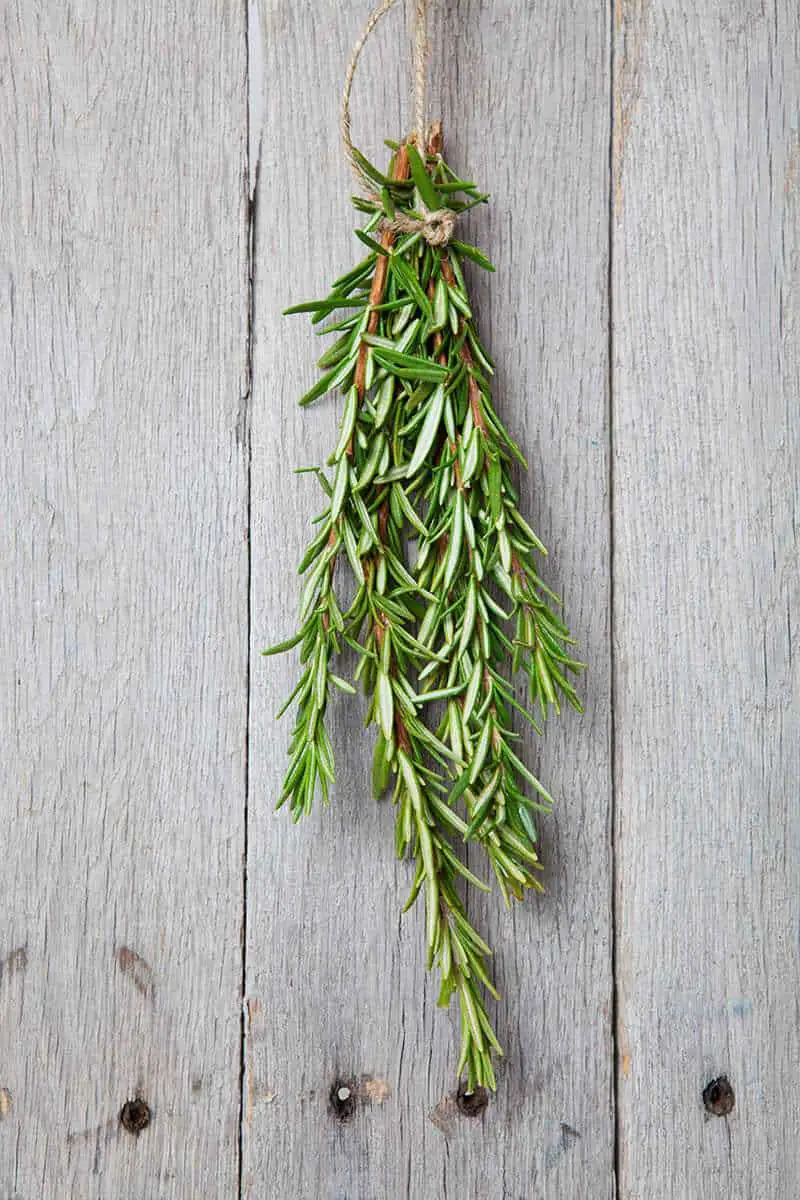
Once again, thanks to its texture, rosemary can dry very well with several methods as air-dry, oven-dry, or dehydrating.
First, you have to wash and dry your herb sprigs, then tie them on the root and hang a bunch of them in any well-ventilated places in your house to dry them naturally.
Oven-drying is also widely used if you have an oven at home. Be noted to set your machine at the lowest temperature. Or, if you have a food dehydrator, like an oven method, set the lowest degrees and wait for a few days until brittle and crumbles.
Rosemary Infusion
Sounds quite strange, but it works. Trust me! All you have to do is infuse the herb with vinegar or olive oil for 2 to 3 weeks.
After that time, you will filter the mixture again to get rid of the solids, then keep it in a clean bottle. With this infusion, you can spread it over your salads or use it for marinades, rubs, and drinks.
Rosemary Citrus Salt
It is one of the best ways to use rosemary in any grilled dish. You will need sea salt, rosemary leaves, and some citrusy zest like lemon, and puree them in a food processor until smooth to make rosemary citrus salt.
Keep the mixture in an airtight food container, so every time you have a BBQ party, just sprinkle a little bit of them on your meaty or veggie dishes.
Health Benefits From Rosemary – More Than You Expect
Let’s begin this part with rosemary nutrient information so you can see how many vitamins, minerals, and their level in 100 grams of rosemary.
| Nutrient | Fresh Rosemary (Per 100 Grams) |
| Calories | 131 |
| Total Fat | 5.9 g |
| Sodium | 26 mg |
| Total Carbohydrate | 21 g |
| Dietary Fiber | 14 g |
| Protein | 3.3 g |
| Folates | 109 ug |
| Vitamin A | 2924 IU |
| Vitamin C | 21.8 mg |
| Calcium | 317 mg |
| Iron | 6.65 mg |
| Magnesium | 91 mg |
It is clear to see that rosemary is a good source of vitamin A, C, calcium, iron, and magnesium, which can benefit your health in various aspects. Here are some highlights of the health advantages of using rosemary.
- Promote Immune System And Blood Circulation: The high level of antioxidants and anti-inflammatory in rosemary is the main factor that helps you have better immunity and prevent any blood issue.
- Improve Memory, Mood, Concentration, and Release Stress: Rosemary’s aroma has been proven as an excellent source to improve human mood, concentration for better work performance (2). It can also reduce stress or anxiety.
- Can Prevent Cancer: Rosemary extract can slow the growth of cancer cells, particularly breast cancer or leukemia, thanks to the antioxidant compound named carnosic acid in rosemary.
- Can Improve Digestion and Hair Health: Rosemary is perfect for treating digestive illnesses like heartburn, intestinal gas, etc. People also use rosemary oil to get rid of dandruff or dry scalp.
- Good For Brain: Once again, carnosic acid can act as a fighter for any neurological problems, reducing stroke and brain damages.
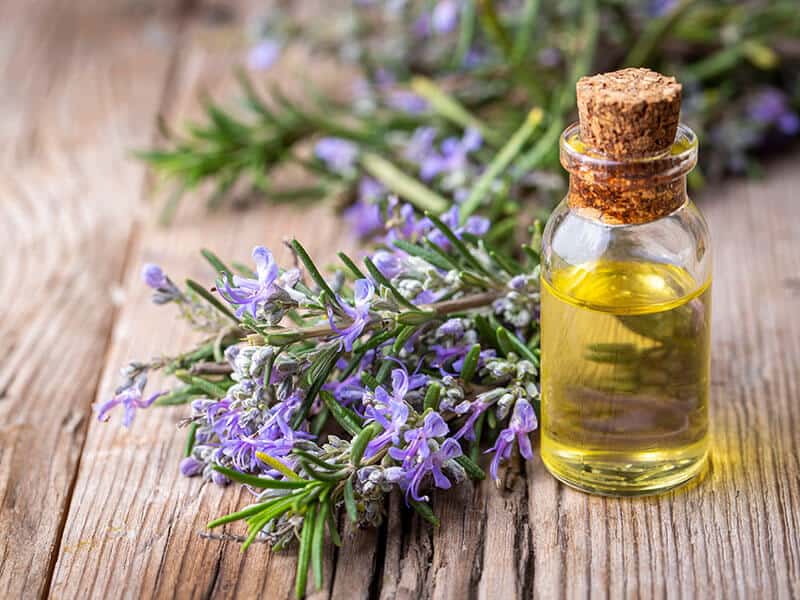
How can rosemary improve your health? Here is the answer.
FAQs
At this point, you might know how essential rosemary is in human lives. But if you still have other concerns about it, these below frequently asked questions and their answers might help you to learn more about rosemary.
Rosemary – A Delicate Herb Comes In Strong and Unique Flavor
Rosemary is truly a fantastic herb that everyone should know. And if possible, try to grow one at home so you can enjoy them every time you want.
Lastly, I hope everything I covered here is sufficient for you to learn new things about rosemary. Do not forget to click like and share if you love this article. Thank you so much!
References
- En.wikipedia.org. 2021. Rosemary – Wikipedia.
- Moss, M., and Oliver, L. 2012.

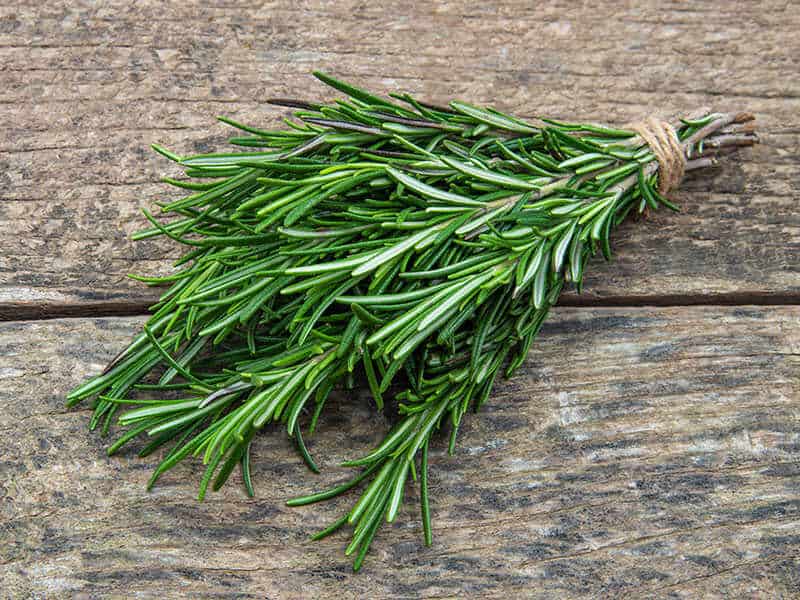
Liam O’Brien
Founder & Recipe Developer
Expertise
Education
Dublin Institute of Technology (now Technological University Dublin)
Ballymaloe Cookery School, County Cork, Ireland
Liam O’Brien is the co-founder and kitchen soul behind Good Tasting Meals, a chef who believes that cooking shouldn’t feel stressful or complicated.
He earned his culinary stripes at Technological University Dublin and polished his farm-to-table skills at Ballymaloe Cookery School. With over 15 years flipping pans and stirring up stories, Liam has worked in family cafés, bustling bistros, and everything in between.
At Good Tasting Meals, Liam brings you recipes that feel like home: cozy, simple, and full of flavor.